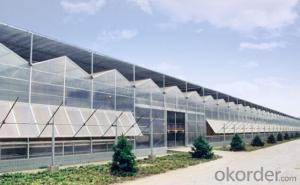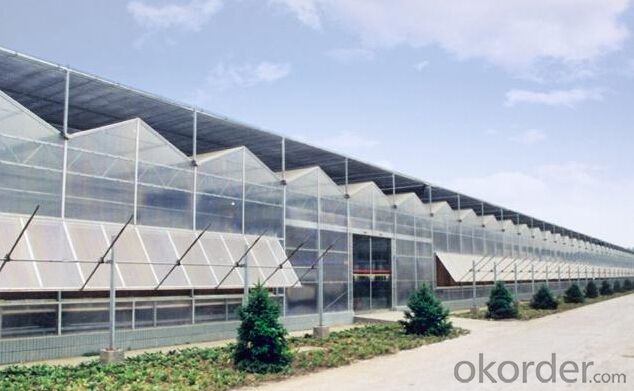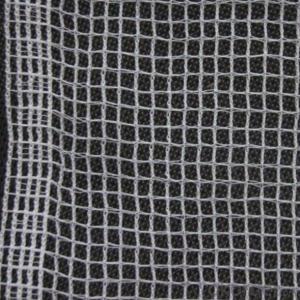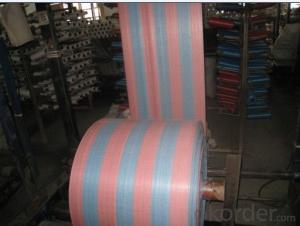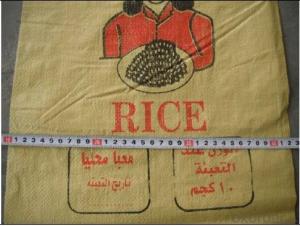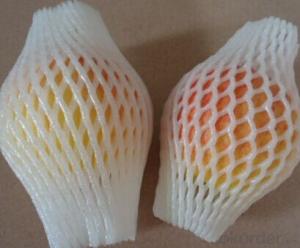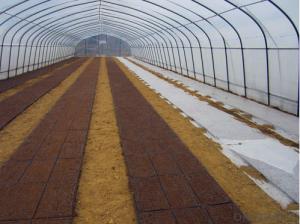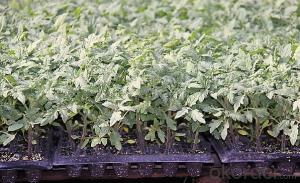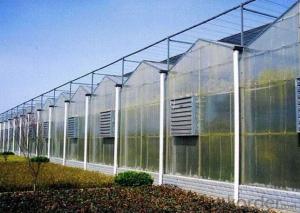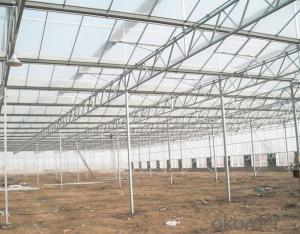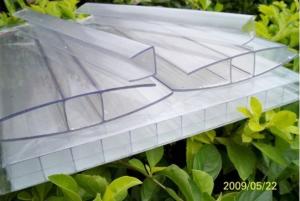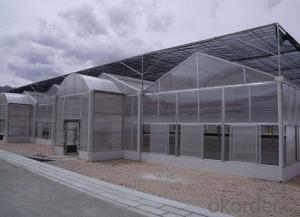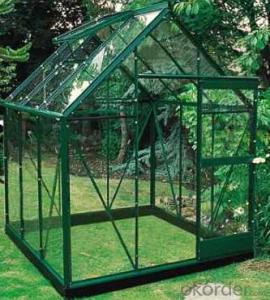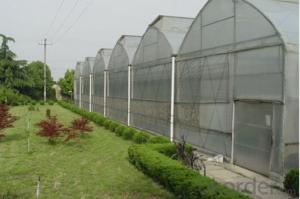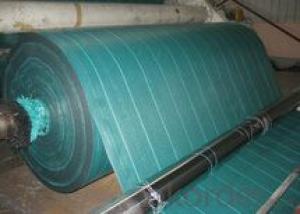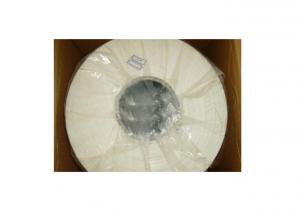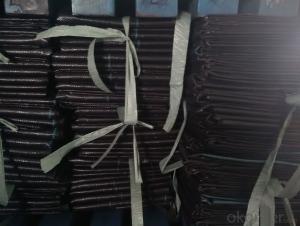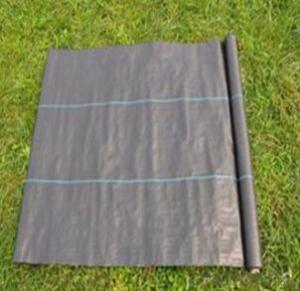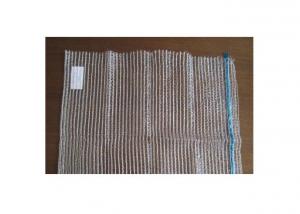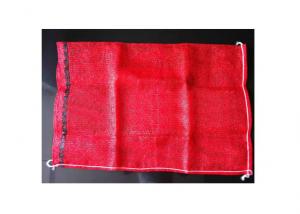Multi-span PC sheet greenhouse for study
- Loading Port:
- Shanghai
- Payment Terms:
- TT OR LC
- Min Order Qty:
- 10 set
- Supply Capability:
- 10000 set/month
OKorder Service Pledge
OKorder Financial Service
You Might Also Like
Specifications
1- POLYCARBONATE GREEN HOUSE
2- Good for warm keeping.
3- Strong,Good Looking.
POLYCARBONATE GREEN HOUSE
1-Structure: Hot galvanized steel tubes, Triple-A Roof structure per bay. 15 year warranty.
2- Covered by twin-wall polycarbonate sheet.10 year warranty. Anti-storm. Anti-hail. Anti-Snow. Best material for warm-
keeping.
3-Strength: Long life ,Good looking, Warm keeping. Energy saving in winter.
4-Suitable for heavy snow place, flower market, expensive flower & vegetable planting, research center or restaurant.
Optional:
1-Outside&Inside Shading system controlled.
2- Cooling Pad & Fan system.
3-Auto-enviroment controlled panel.
4-Rounf Roof instead of Triple A-Style is available with simplified structure.
- Q: How does agricultural plastic affect crop quality grading?
- Agricultural plastic can have both positive and negative effects on crop quality grading. On one hand, plastic mulch can enhance crop productivity and quality by controlling weed growth, conserving moisture, and preventing soil erosion. This can result in higher crop yields and improved grading scores. On the other hand, if plastic waste is not properly managed and disposed of, it can contaminate the field and affect crop quality. Plastic fragments or residues left behind can lead to lower grading scores, especially if they are visually detectable or affect the taste or texture of the crop. Therefore, it is crucial to use and dispose of agricultural plastic responsibly to minimize its negative impact on crop quality grading.
- Q: This question asks for methods to protect agricultural plastic films from damage and tearing.
- <p>To prevent agricultural plastic films from being damaged or torn, follow these practices: 1. Choose high-quality films with UV stabilizers to resist degradation from sunlight. 2. Properly install the films to avoid sharp objects or rough handling that could cause punctures or tears. 3. Regularly inspect the films for any signs of wear or damage and repair them promptly. 4. Use windbreaks or barriers to reduce the impact of strong winds that can cause the films to flap and tear. 5. Keep the area around the films clean to prevent debris from scratching or damaging the film. 6. Use appropriate weights or anchors to secure the films and prevent them from lifting and tearing. By implementing these measures, you can extend the life of your agricultural plastic films and maintain their effectiveness.</p>
- Q: How do agricultural plastic products affect soil health?
- Agricultural plastic products can have both positive and negative effects on soil health. On one hand, plastic mulches can help retain soil moisture, suppress weed growth, and prevent erosion, leading to improved soil health. Additionally, plastic films used for greenhouse cultivation can provide a controlled environment for better plant growth and yield. However, improper disposal of plastic products or the use of non-biodegradable plastics can have detrimental consequences. Plastic residues can accumulate in the soil, affecting its structure, nutrient cycling, and microbial activity. Moreover, plastic debris can contaminate water sources, harm soil-dwelling organisms, and disrupt the overall ecosystem. Therefore, careful management and responsible use of agricultural plastics are crucial to minimize their negative impact on soil health.
- Q: Can agricultural plastic products be used for bee hive insulation?
- Yes, agricultural plastic products can be used for bee hive insulation. These plastic products, such as plastic sheets or wraps, can help to provide an additional layer of insulation to protect bee hives from extreme temperatures and maintain a stable environment for the bees. However, it is important to ensure that the plastic materials used are safe for bee health and do not release harmful chemicals.
- Q: Are nursery trays suitable for starting carnivorous plants?
- Yes, nursery trays can be suitable for starting carnivorous plants. These trays provide a controlled environment for the plants, with proper drainage and sufficient space for their initial growth. However, it is important to ensure that the trays are clean and sterile to prevent any contamination or disease. Additionally, carnivorous plants have specific soil and water requirements, so it is crucial to use the appropriate substrate and maintain proper watering practices to promote their healthy development.
- Q: How do agricultural plastic products assist in hydroponic nutrient solution monitoring?
- Agricultural plastic products can assist in hydroponic nutrient solution monitoring by providing a reliable and efficient way to measure and control the nutrient levels in the solution. For example, plastic containers can be used as reservoirs to store and mix the nutrient solution, allowing for easy monitoring and adjustment of the solution's composition. Additionally, plastic tubing and fittings can be used to create a closed-loop system that allows for precise delivery of the nutrient solution to the plants, further aiding in monitoring and controlling nutrient levels. Overall, agricultural plastic products play a crucial role in facilitating accurate and efficient nutrient solution monitoring in hydroponic systems.
- Q: Are nursery trays suitable for outdoor gardening?
- Yes, nursery trays are suitable for outdoor gardening. They provide a convenient way to start seeds or propagate plants before transplanting them into the ground. Nursery trays help in controlling the growth and development of seedlings, protecting them from pests, and providing optimal growing conditions.
- Q: Are there any ground cover plants that are suitable for moist shade?
- Yes, there are several ground cover plants that are suitable for moist shade. Some examples include ferns, hostas, lily of the valley, ajuga, and creeping myrtle. These plants thrive in areas with limited sunlight and damp soil conditions, making them perfect choices for moist shade areas in gardens or landscapes.
- Q: I have plastic trays that had bearings in them . Over time will the oil in the trays cause any chemical reaction ?
- If bearing oil is petroleum-based, then yes eventually it will eat the plastic.
Send your message to us
Multi-span PC sheet greenhouse for study
- Loading Port:
- Shanghai
- Payment Terms:
- TT OR LC
- Min Order Qty:
- 10 set
- Supply Capability:
- 10000 set/month
OKorder Service Pledge
OKorder Financial Service
Similar products
Hot products
Hot Searches
Related keywords
